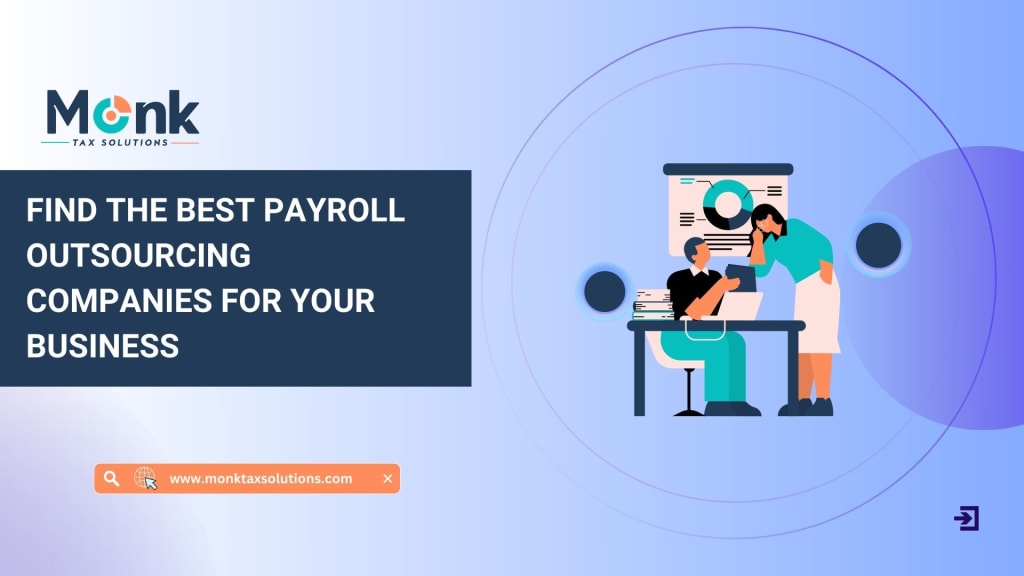Outsourcing Payroll: Maximize Efficiency And Minimize Expenses
본문
✔ Outsourcing payroll might lower administrative burdens, save time, and guarantee compliance with tax laws.
✔ Cost cost savings range from 18%-35% on typical compared to in-house payroll processing.
✔ Payroll companies manage wage computations, tax filings, direct deposits, benefits reductions, and more.
✔ Businesses of all sizes advantage, specifically those without dedicated payroll personnel.
✔ Choosing the ideal payroll service depends on business size, intricacy, and need for combination with existing systems.
Every other Friday, Lisa braced herself for what had basically end up being a constant source of tension: payroll. As the office supervisor for a growing home services business, she used lots of hats: scheduling tasks, handling billings, managing HR tasks, and more. Payroll was just one more obligation on her overruning plate, and despite her finest efforts, something always appeared to fail.

Last pay period, she overestimated overtime for two service technicians, causing a payroll correction that took hours to repair. The month in the past, a tax filing deadline slipped through the cracks, resulting in a pricey late fee. And then there were the consistent questions from workers about their incomes - was my perk consisted of? Why are my reductions various today? Exists still time to fix my punch card? When will I get my W-2?
Lisa's tension level was through the roofing system. Something had to change. Accordingly, Lisa started exploring her alternatives. What if the company had another person deal with payroll? By handing off payroll to an expert company, or, at the very least, updating their software, she might eliminate the threat of errors, make sure compliance with tax laws, and maximize hours each week to focus on running business.
Does your payroll journey imitate Lisa's? Is payroll an obstacle that looms at the end of every other week? Luckily, you're not alone. In this short article, we'll check out how outsourcing payroll works, the advantages it provides, and whether it's the ideal move for your business.
Outsourcing payroll is the practice of handing off payroll-related jobs to a third-party company who concentrates on processing wages, taxes, and other compensation-related duties. Instead of managing payroll by hand - or juggling several software application options - companies can count on professionals to make sure workers are paid correctly and on time while staying certified with tax laws.
Payroll suppliers handle a range of tasks, including:
✅ Processing employee wages and professional payments;
✅ Calculating and filing payroll taxes;
✅ Managing direct deposits and paper checks;
✅ Handling reductions, garnishments, and advantages contributions; and
✅ Keeping up to date with ever-changing labor laws and tax rates.
Approximately 61% of companies outsource their payroll procedures. The decision to contract out the whole function or segment out portions, such as tax filings or direct deposit management, mainly depends upon company size, payroll complexity, and internal resources.
For larger businesses with staff members throughout multiple states, payroll outsourcing can streamline compliance with different tax laws and guidelines. But small and mid-sized organizations likewise benefit - specifically those without a dedicated payroll professional. Considered that payroll laws often alter, contracting out ensures organizations remain certified without needing to continuously keep an eye on updates.
Years back, it was unusual for companies to entrust payroll to an outside supplier. But today, advances in payroll innovation make outsourcing an economical and effective service. Whether you require full-service payroll support or simply assist with specific jobs, outsourcing can release up important time, minimize administrative headaches, and give entrepreneur peace of mind. Statistics back this up. According to a PwC research study, business that outsource their payroll works experience expense reductions of 18%-35%, typically.
Is outsourcing payroll the best choice for your company? In the next area, we'll check out the crucial benefits and possible disadvantages to help you decide. If not, a best practice may consist of upgrading your internal software. While we're biased, an option like OnTheClock permits you to encapsulate time tracking, scheduling, and payroll in one platform. No more third-party costs, delays, or errors!
Don't let taxes get you down. Make payroll simple with OnTheClock!

Your trouble-free service for payroll.
The Benefits of Outsourcing Payroll
Having your personnel complete payroll might seem like a cost-savings step; however, the reality is that it's typically time-consuming, complex, and susceptible to expensive mistakes. Outsourcing payroll provides companies a structured, safe, and cost-efficient option. Here's how it can benefit your company:
Save Time and Boost Productivity: Payroll isn't almost transferring revenue - it involves tracking hours, determining taxes, managing advantages deductions, and guaranteeing compliance with ever-changing regulations. For small services, this duty often falls on a bachelor or a small HR group, pulling focus far from tactical initiatives. Outsourcing payroll gets rid of these time-consuming jobs, maximizing your team to focus on growth and worker engagement.
Reduce Payroll Costs: Many small and mid-sized services discover that contracting out payroll is more cost-effective than preserving an internal payroll group. The expenditures related to payroll software, worker training, tax filing, and compliance management can accumulate quickly. By outsourcing, companies can access professional payroll services at a predictable monthly cost - typically less than the cost of hiring a full-time payroll professional.
Minimize Errors and Ensure Compliance: Payroll mistakes aren't just aggravating - they can lead to substantial punitive damages. From overestimating tax withholdings to missing out on due dates, mistakes can activate audits, fines, and dissatisfied workers. Payroll suppliers concentrate on tax compliance, keeping up to date on federal, state, and local policies to make sure precise filings and timely payments.
Enhance Data Security: Payroll data consists of sensitive employee info, such as Social Security numbers and savings account details. Cybersecurity threats and internal fraud risks make payroll security a leading priority. Professional payroll providers invest in advanced encryption, secure cloud storage, and multifactor authentication to keep your company's monetary information safe.
Avoid Payroll Disruptions: If your in-house payroll expert takes a vacation, gets ill, or leaves the business, payroll operations can be tossed into mayhem. Outsourcing supplies connection and reliability, guaranteeing payroll is processed properly and on time, whenever.
Simplify Direct Deposit and Benefits Integration: Many small services struggle to set up direct deposit or appropriately integrate payroll with benefits administration. Payroll suppliers streamline this procedure, guaranteeing employees are paid immediately and deductions for benefits like medical insurance and retirement strategies are managed correctly.
Scale With Your Business: As your company grows, payroll complexity boosts. More employees mean more tax obligations, benefit alternatives, and compliance requirements. A payroll service provider can scale with your business, adapting to brand-new challenges without needing you to hire additional HR workers.
The Downsides of Outsourcing Payroll
While contracting out payroll can save time and reduce administrative problems, it's not without its challenges. Before committing to an external service provider, it's important to weigh the prospective drawbacks and determine whether the trade-offs align with your organization's needs.
Loss of Control Over Payroll Processes: When you contract out payroll, you relinquish direct oversight of vital payroll functions. While automation and dedicated payroll professionals can lessen errors, you may have restricted exposure into the process. If an error takes place, such as an inaccurate paycheck or a missed tax filing, it might take longer to fix than if payroll were handled in-house. Additionally, you might have to depend on client assistance teams with varying levels of responsiveness rather than making immediate adjustments yourself.
Data Security Concerns: Outsourcing requires sharing sensitive employee details, consisting of Social Security numbers, salaries, and tax information, with a third party. While the majority of payroll providers carry out robust security measures, information breaches remain a threat. Additionally, since you do not control their security procedures, you're depending on their ability to safeguard staff member data. Any lapse in security could cause identity theft, compliance problems, or financial losses.
Limited Customization and Flexibility: Payroll providers normally provide standardized services that may not perfectly align with your business's requirements. If your business has unique payroll structures, such as specific bonus offers, commissions, or industry-specific reductions, adjusting to a third-party system can be challenging. Furthermore, last-minute payroll modifications, such as adding an expenditure compensation or fixing a tax code, might not be as seamless as they would be with an internal payroll team.
Potential Hidden Costs: While outsourcing can appear cost-efficient, expenditures can accumulate beyond the base membership cost. Some service providers charge additional for year-end tax filings, compliance updates, off-cycle payroll runs, or combination with other company software application. If your company needs regular payroll modifications or personalized reporting, these extra costs can rapidly surpass the preliminary budget. Employee Experience Challenges: When payroll is contracted out, employees frequently have to call a third-party provider for payroll-related concerns or issues. This can create a disconnect, as staff members may fight with impersonal customer service, long haul times, or irregular assistance quality. Unlike an in-house payroll group that comprehends business culture and policies, an outsourced service provider might not use the same level of familiarity or responsiveness.
Dependency on Provider Stability: Relying on an external business for payroll implies your service is vulnerable to its functional stability. If the service provider experiences financial problem, technical failures, or unexpected service disruptions, your payroll process could be affected. In severe cases, a company closing down unexpectedly could cause lost payroll data and significant operational headaches.
The Different Kinds Of Payroll Services
Not all payroll outsourcing services are created equivalent. Businesses have various needs, and payroll service providers offer numerous levels of service to accommodate them. Whether you wish to hand off whatever or keep some control, there's an outsourcing model that fits your company. Here are the main kinds of outsourced payroll services:
1. Full-Service Payroll Outsourcing: If you're searching for an entirely hands-off technique, full-service payroll outsourcing is the method to go. This kind of service provider deals with every aspect of payroll, consisting of:
- Calculating salaries and reductions;
- Managing tax filings and compliance;
- Administering employee advantages; and
- Handling direct deposits and paychecks.
With a full-service provider, all you require to do is provide employee information, such as hours worked and wage updates. While this choice is the most hassle-free, it also tends to be the most pricey. Plus, services require a reputable system for sharing precise payroll details on time.
2. Partial Payroll Outsourcing: For organizations that choose to retain some control over payroll but offload complex jobs, partial outsourcing is a fantastic happy medium. Companies might select to:

- Manage staff member time tracking and attendance in-house while contracting out tax filing;
- Handle direct deposit themselves however contract out compliance and reporting; and
- Keep payroll processing internal but utilize an external supplier for year-end tax types.
This design permits business to lower their administrative burden while keeping oversight on critical payroll functions.
3. Cloud-Based Payroll Services: Cloud-based payroll outsourcing deals flexibility and real-time access to payroll data. These services:
- Automate payroll computations and tax filings;
- Allow employees to gain access to pay stubs and tax files through self-service portals; and
- Integrate with accounting and HR software.
Since cloud payroll solutions are web-based, organizations can handle payroll from anywhere. This option is ideal for remote groups and growing companies that require scalability.
4. International Payroll Outsourcing: For companies with an international workforce, global payroll service providers streamline the intricacies of managing workers throughout different countries. These services:
- Ensure compliance with local tax laws and labor policies;
- Handle multi-currency payroll processing; and
- Manage cross-border payroll tax filings.
Outsourcing international payroll can avoid pricey compliance errors while improving payments for overseas staff members.
5. DIY Payroll with Provider Support: Some payroll suppliers provide a hybrid technique where services deal with the majority of payroll tasks however utilize software and tools offered by the outsourcing business. This model is perfect for companies that:
- Wish to keep direct control over payroll processing;
- Need automation tools to simplify calculations; and
- Prefer expert assistance for compliance concerns.
This approach combines the flexibility of in-house payroll with the security of expert assistance.

How to Choose the Proper Payroll Partner
The ideal payroll service depends on your business's size, structure, and needs. If you want a totally hassle-free experience, full-service outsourcing might be the best option. If you need flexibility, partial or cloud-based services might be a better fit. Here's a list of actions you ought to consider when picking the best payroll supplier.
Define Your Payroll Needs: Before comparing suppliers, overview precisely what you require from a payroll service. Are you searching for full-service payroll that handles everything, or do you prefer partial payroll outsourcing where you retain control over particular jobs? Consider features like direct deposit, tax filing, benefits administration, and compliance tracking. If your company runs in numerous places or utilizes remote workers, you might also need multistate or international payroll capabilities.
Integration with Existing Tools: A smooth payroll procedure depends upon how well your payroll service provider integrates with your existing systems. Search for solutions that get in touch with your scheduling software, HR platforms, and time tracking tools. Proper combination can lower manual data entry, reduce mistakes, and enhance total efficiency.
Compliance and Tax Expertise: Payroll is more than just paying staff members - it involves tax filings, deductions, and compliance with labor laws. A trustworthy payroll partner ought to remain up to date with changes in tax policies and make sure precise reporting to avoid pricey charges. Ask potential companies about their compliance processes and how they deal with updates to federal, state, and regional tax laws.
Pricing Structure and Value: Cost is a significant factor when selecting a payroll company, however the least expensive option isn't constantly the very best. Compare prices models, as some service providers charge a flat month-to-month charge, while others bill per pay duration or per worker. Many payroll solutions, including OnTheClock Payroll, tend to be around $40 each month and $6 per employee. Make sure to account for any extra costs for tax filings, direct deposits, or HR add-ons. The very best payroll partner uses a balance of cost and worth, saving you time and minimizing payroll-related headaches.
Customer Support and Service Quality: Payroll mistakes can be demanding, so having access to responsive consumer assistance is necessary. Evaluate the supplier's service alternatives: Do they use live phone assistance, chat, or email assistance? Check online evaluations and testimonials to assess their credibility for customer care. A payroll partner with strong assistance can rapidly fix issues and keep payroll running efficiently.
Security and Data Protection: Payroll data consists of delicate staff member details, making a top priority. Ensure your payroll service provider utilizes strong encryption, multi-factor authentication, and secure servers to safeguard against cyber dangers. Ask about their data backup policies and how they handle security breaches.
Scalability and Flexibility: Your payroll requirements might progress as your service grows. Choose a company that can scale with you, whether you're including new staff members, expanding to multiple locations, or requiring extra features like advantages management or time tracking. A versatile payroll partner will accommodate changes without requiring a significant overhaul of your payroll procedure.
Service Level Agreements (SLAs): A trustworthy payroll company ought to provide clear service level arrangements (SLAs) that outline key efficiency expectations, such as payroll accuracy, processing times, and compliance warranties. These arrangements assist make sure accountability and provide a criteria for examining service quality.
Reputation and Industry Experience: Finally, research the company's track record. Search for client testimonials, market accreditations, and case studies that demonstrate their knowledge. If possible, choose a payroll partner with experience in your market, as they'll recognize with sector-specific payroll requirements and compliance difficulties.
Outsourcing Payroll: Common Challenges and Best Practices
Outsourcing payroll can be a game-changer for companies, minimizing administrative workload, enhancing precision, and making sure compliance. However, turning over such a vital function comes with its own set of obstacles. If not managed correctly, business can deal with interaction breakdowns, security dangers, and compliance issues. Below are some common difficulties services experience when contracting out payroll and some steps to assist overcome them.

Loss of Control Over Payroll Processes
When you outsource payroll, you relinquish direct oversight of payroll estimations, tax filings, and worker payments. This can lead to issues about transparency, accuracy, and responsiveness.
- Choose a supplier that provides real-time reporting and payroll control panels so you can monitor deals.
- Establish clear expectations from the beginning, including due dates, data accuracy requirements, and escalation procedures.
- Maintain internal payroll proficiency to examine reports and make sure payroll accuracy.
Communication Breakdowns
An absence of appropriate interaction between your business and the payroll service provider can cause mistakes, delays, and disappointment. Misunderstandings about data submissions, reporting requirements, and worker categories can trigger considerable disruptions.
- Designate a dedicated point of contact on both sides to guarantee smooth communication.
- Set up routine check-ins to evaluate payroll procedures, fix problems, and provide updates.
- Use cloud-based payroll platforms that enable real-time access to reports and automated notifications.
Data Security and Privacy Risks
Payroll data contains extremely sensitive staff member information, including Social Security numbers, bank details, and wage records. A security breach can cause identity theft, financial fraud, and legal liabilities.
- Work with a company that utilizes advanced encryption, multifactor authentication, and safe and secure information storage.
- Limit access to payroll information by defining user functions and permissions within the system.
- Regularly review the service provider's security policies and need compliance with industry requirements like SOC 2 and GDPR.
Compliance and Regulatory Risks
Payroll laws and tax guidelines often alter, and noncompliance can lead to substantial fines and penalties. If your payroll provider stops working to remain updated, your business could be at risk.
- Partner with a service provider that concentrates on your industry and is fluent in federal, state, and regional tax laws.
- Request regular compliance audits to make sure payroll tax filings and staff member classifications are precise.
- Maintain internal oversight by remaining notified about payroll regulations that impact your business.
Hidden Fees and Unexpected Costs
Some payroll service providers charge additional for services like tax filings, compliance updates, and software application upgrades. Without a clear understanding of costs, companies can deal with spending plan overruns.
- Review the agreement thoroughly before signing and clarify all expenses, consisting of per-payroll costs, year-end reporting charges, and add-on services.
- Choose a provider with transparent, all-inclusive rates to prevent unanticipated expenses.
- Regularly evaluate whether the payroll service is affordable for your company.
Integration Challenges
If your payroll supplier's system does not incorporate smoothly with your existing accounting, HR, or time tracking software, it can cause ineffectiveness and manual data entry errors.
How to Overcome It
- Select a supplier that uses seamless combination with your existing tools, such as QuickBooks or OnTheClock.
- Test the combination before totally transitioning to outsourced payroll to identify possible problems.
- Work closely with your provider to tailor information exports and imports for precision and performance.
Final Thoughts

Lisa's story is all too familiar to many company owner and workplace managers. Payroll errors, compliance concerns, and constant interruptions can turn payday into a source of tension rather of an easy process. By outsourcing payroll, Lisa took control of her time, reduced mistakes, and guaranteed her team was paid accurately and on time.
If payroll has actually become a problem for your service, it might be time to check out a better service. OnTheClock Payroll simplifies the process, so you can focus on running your business - not stressing over incomes. Ready to simplify payroll? Try OnTheClock Payroll today and let us manage the heavy lifting so that you can concentrate on what matters most: growing your service!

댓글목록0
댓글 포인트 안내